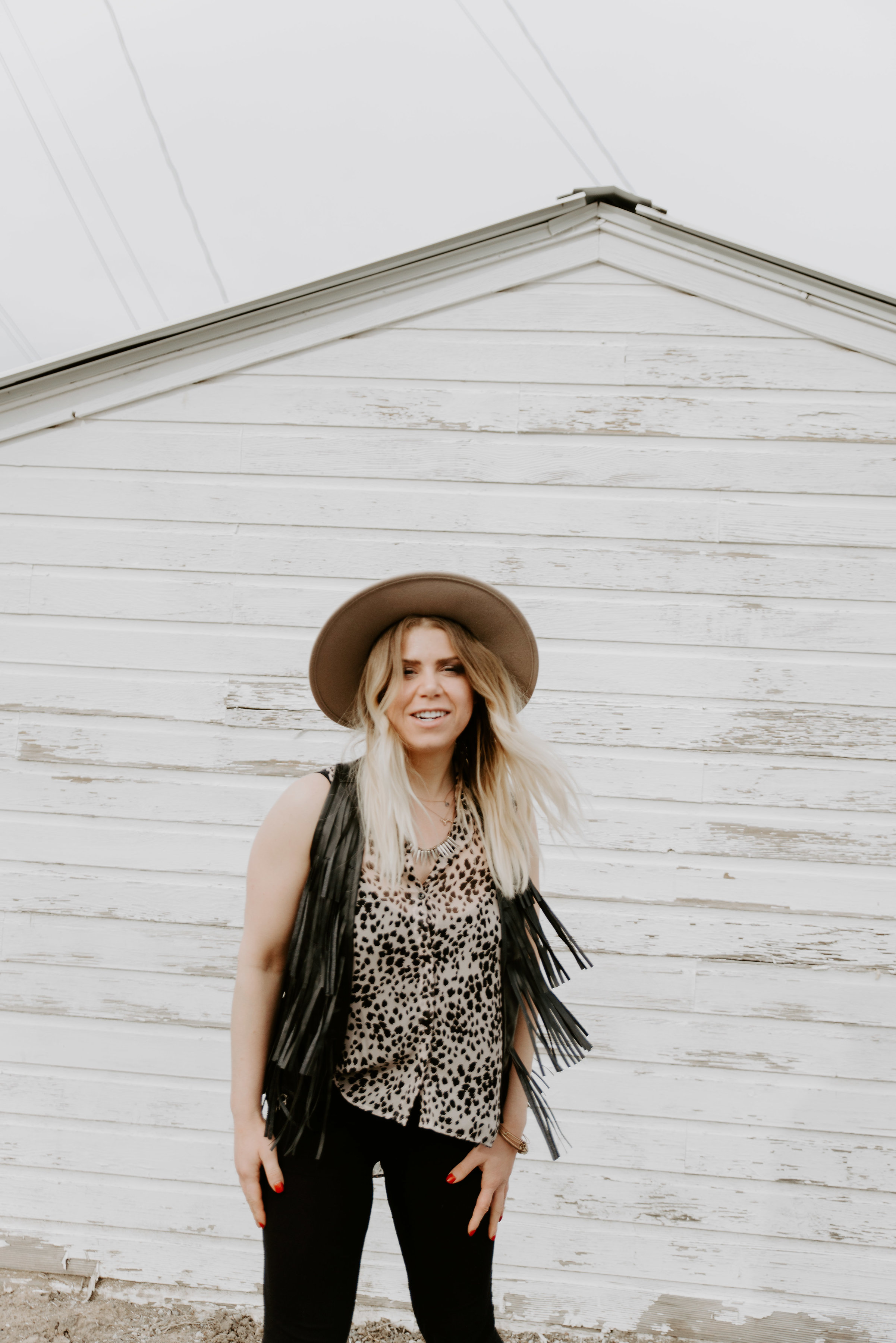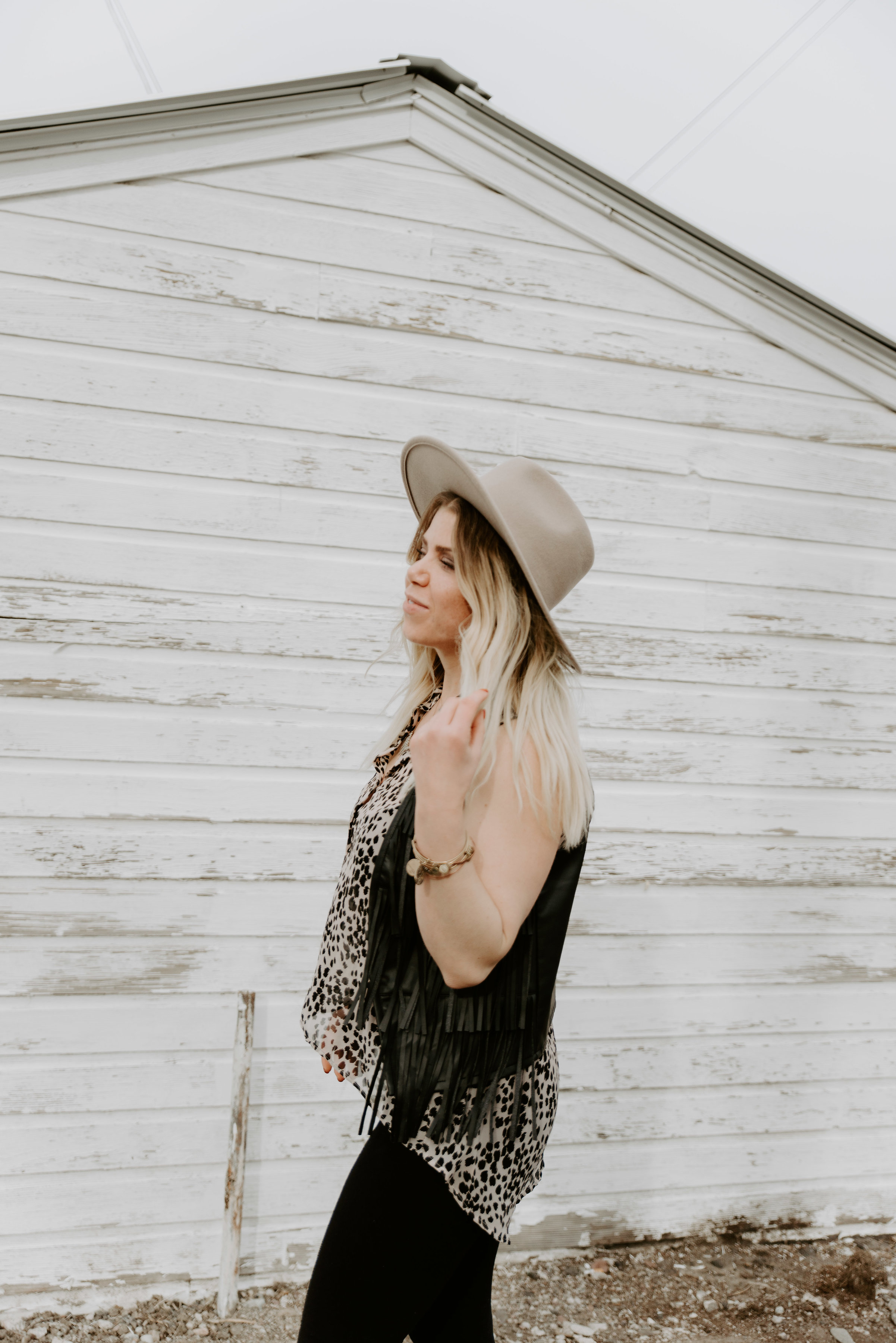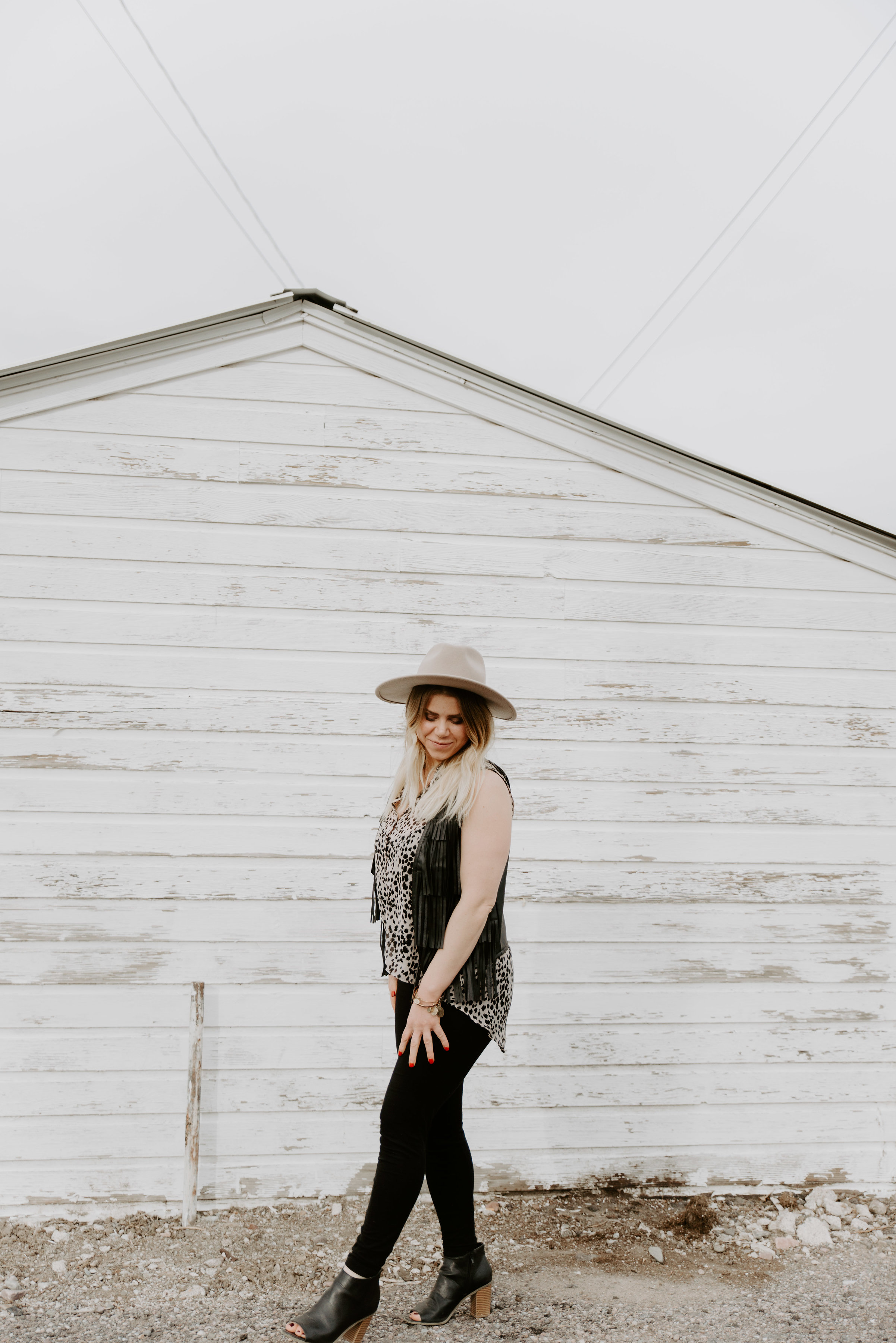L I T T L E white T E E
Images by Brooke Richardson Photography
“I like the sort of nothingness of the jeans and the t-shirt.”
There’s just something about a basic white tee that is so classic. So fresh and so versatile. So timeless.
It can be easily dressed up or down.
“Make it simple but significant.”
Throw on some sandals or flats or sneaks, and you have a clean, chic look. Slip into stilettos or platforms, and you have a look worthy of a night out. From statement shoes to statement accessories, you can really pump up the look or keep it low key.
The basic white tee is like a blank canvas open to whatever vibe you’re feeling.
“With good basics you’ll have endless options.”
As you can see here, I played around with belts, shoes, and a hat. Simple changes can yield powerful results.
xx,
-w-
D A R E to be Y O U
Images by Brooke Richardson Photography
“You are allowed to be both a masterpiece and a work in progress, simultaneously.”
Let me start off by saying this is not directed at any particular person (man, what an opener, right?).
I really want to express gratitude for all of the good vibes thrown my way lately, specifically about my physique. People have been so kind and complimentary (vocab check: in addition to “free” it also means “expressing a compliment; praising or approving - fun fact for the day!).
People have noted I look thinner, and have commented on how svelte I look and how hard I’ve worked to get there.
The truth is…I haven’t. Worked hard at it, that is.
Let me explain. I actually liked the way I looked before my [slight] weight loss (it’s not like I’ve dropped 20 lbs, but even minor weight fluctuations on my petite frame are noticeable - for “good” and “bad”). It was a long road to escape body dysmorphia and the sick societal “six pack or bust” ideal. I learned to truly celebrate my curves and embrace my body type. I understood strength and fitness trumped physical form. What I could do and how I felt doing it were far more important than what I looked like [doing it].
“Don’t waste so much time thinking about how much you weigh. There is no more mind-numbing, boring, idiotic, self-destructive diversion from the fun of living.”
Obsessing over what I looked like was consuming a ridiculous amount of mental and emotional bandwidth. ENOUGH. Honestly, I just maxed out (physically, mentally, emotionally). So I dug deep and got to a fantastically solid place. I lived intuitively, I ate intuitively. Life was good.
And then randomly my appetite started ghosting. I don’t know about you, but my appetite naturally ebbs and flows - independent of my physical activity. Sometimes I’m barely hungry, other times I’m a food fiend.
This time, however, my appetite stayed extremely low, oftentimes non-existent. It’d reappear every once in awhile, but for the most part - gone-zo. We’re talking 6+ months. For an intuitive eater honoring their appetite, I was knocked for a loop. I only ate when hungry, so when you’re never friggin’ hungry, you can see how this starts to mess with you. When you get to the end of the day and you’ve only had a piece of fruit or two and a salad, you feel you should eat. Your body needs a certain amount of calories to thrive, and it’s not like I’m couched up all day doing nothing (even then, you still need a minimum amount of calories to, you know…EXIST).
Every so often I’d eat just to eat, to keep my energy levels up. I felt fine - nothing else seemed wrong physically. I dialed back on my workouts to protect my caloric expenditure. What got me was the mental aspect. I started missing eating! Sure, you should lean more toward eating to live rather than living to eat but what’s so wrong with enjoying food for food’s sake?!! It’s one of life’s pleasures! I can’t tell you how stoked my salads make me. You can still honor your appetite while feeling gaga over grub. Eating is a necessity, so why not feel blissed while doing it?!
“Your diet, exercise routine, and stress level lay the foundation for how you feel, so fuel your body with good nutrition, break a little sweat each day, and set aside time to unwind.
Because it’s hard to feel bad about a body you’re taking great care of.”
Okay, bringing it back to my post’s purpose. Amid all of the kind words and good vibes, I felt compelled to clarify my weight loss isn’t intentional. Personal evolution in all of its forms is a beautiful thing, and I don’t discredit it in any way, but…I think it’s important for us to push back against a world insisting we look a certain way. A world that praises emaciation over health. Visible muscles over a healthy metabolism. This is my reminder for us all (YES - ME INCLUDED!).
“I’m not going to sacrifice my mental health to have the perfect body.”
Simply because I’ve grappled with it myself, one of the causes for which I’m most passionate about advocating is self-acceptance, in all of its various forms. Especially in an era where social media heightens the stakes, amplifies the risks, and elevates the standards.
“Shoutout to all the people out there trying to love themselves in a world constantly telling them not to.”
Society offers conditional acceptance based on our physical appearance. The strongest, most rebellious act you can do is DARE to be your own self. Accept and love your body. Exercise and nourish it to amplify its health and strength, not its aesthetic and sex appeal. Honor and work with its natural rhythms. Stop fighting it, just because social media demands you look a certain way. This includes de-fogging the lens through which you appraise beauty (others and your own!) and rejecting the unattainable beauty ideals. Unconditionally loving and accepting yourself in a world that’s doing its damndest to change you is the most revolutionary act of all - and one that is CRUCIAL to your health and wellbeing.
We come in all different shapes and sizes.
You do you, boo.
xx,
-w-
“I would only lose weight if it affected my health or sex life, which it doesn’t.”
I N T O the S H A D O W S
Images by Whitney Richardson Photography
Modeled by Nicole Spinnler
Assisted by Cari Spinnler
“How can I be substantial if I do not cast a shadow? I must have a dark side also if I am to be whole.”
Where there is lightness, there is darkness. Yin and yang. The blazing sun casts a deep shadow. Put simply, it is N A T U R A L. Therefore, it is natural for even the lightest souls to also contain shades of darkness. It is within every single one of us. We all have a shadow.
When it becomes problematic is when we deny this shadow. We pretend it's not there, or even actively reject it. Why is this problematic? The shadow doesn't easily take a hint, then take a hike. No, it lingers. It lingers and it gets its due by seeping into our thoughts, our actions, and our words, whether we're aware of it or not. Ultimately, it blocks true happiness, authenticity, and evolution.
So what is the shadow? The shadow is a concept discovered by the Swiss psychologist Carl Jung. The shadow is the “dark side” of our personality because it consists mainly of primitive, negative human emotions and impulses like rage, envy, greed, selfishness, desire, and the desire for power.
“Until we have met the monsters in ourselves, we will keep trying to slay them in the outer world. For all darkness in the world stems from darkness in the heart. And it is there we must do our work.”
The personal shadow is the disowned self. This shadow self represents the parts of us we no longer claim to be our own, including inherent positive qualities.
As I mentioned, these unexamined or disowned parts of our personality don’t go anywhere. As if. Although we deny them in our attempt to cast them out, we don’t eliminate them. They're stillll there.
We repress them; they are part of our unconscious. Put simply, the unconscious is everything of which we are not conscious.
These emotions are part of our shared humanity. We're all in this together. But as we grow up, something happens.
Traits associated with “being good” are accepted, while others associated with “being bad” are rejected. We all have basic human needs. These needs include physiological needs, safety and security needs, and needs for belonging. These needs are biological and instinctual.
As humans, we are motivated by our needs. So when we perceive an aspect of ourselves as threatening one of our needs (typically the needs for safety, love, and belonging) we shove those aspects into the shadows. We pick up cues from our environment, so if we experience/witness a trait being condemned by others (especially our caretakers), we repress and deny, baby. Repress and deny.
I mean, think about it. If you go deep and consider this from an evolutionary standpoint, our very safety and existence depends on our caretakers' (parents - biological or otherwise) acceptance and approval. We ain't tryna repel them, leaving us to fend for ourselves. We need them to feed and protect us. And even socially speaking - generally, to be "successful" (personally and professionally) and happy and fulfilled in life, we need social connection. So we will do our damndest to hide any trait we've perceived as socially unacceptable. We want to be liked and accepted by our friends/colleagues/bosses.
Let’s say you realize your need to take better care of yourself (especially you moms and dads!). You create a self-care routine and are feeling psyched about it.
A few days in, though, you start receiving blowback from the people in your life. Maybe your kids are banging on the door while you're working out/meditating, or your boss guilt trips you when you ask to leave work early (or on time!).
Your doubts and fears creep in about this whole self-care thing. You worry you are being regarded as "selfish" and decide to bail on the self care. Before you know it, you’ve taken yourself off your priority list and might even secretly take pride in your selflessness. That’s what “good” people do, after all. Right?
In your quest to be good (likable, lovable, worthy, enough), your ability to focus on yourself has been pushed into the shadows.
In the above example, the shadow is the desire (or need) for self-care. But, somewhere along the way, you were convinced that focusing on your own needs was wrong or bad (aka selfish) so you rejected those desires by denying their existence. You designed your life so it would always appear you were doing “right” by others.
Our egos use this mechanism to defend itself—to defend how it perceives itself. Our false identities of being “good” keep us from connecting to our shadow, which then keeps us from freedom and true acceptance (internal and external).
All we deny in ourselves—whatever we perceive as inferior, evil, or unacceptable—become part of the shadow. Anything incompatible with our chosen conscious attitude about ourselves moves to this dark side.
Trouble pops up when we fail to see it.
Get this: The shadow can operate on its own without our full awareness. It’s as if our conscious self goes on autopilot while the unconscious takes the wheel. Remaining unaware of the shadow harms our relationships with our spouses, family, and friends. It will also impact our professional relationships, as well as our leadership abilities.
“When we deny ourselves a safe outlet to express our dark side - or refuse to even acknowledge its existence - it builds up and becomes a powerful force capable of destroying our life as well as the lives of those around us.”
And those parts of ourselves we slide out of view? We then see them in others.
Whatever qualities we deny in ourselves, we see in others.
In psychology, this is called projection. We project onto others anything we conceal within us.
“If you hate a person, you hate something in him that is part of yourself. What isn’t part of ourselves doesn’t disturb us. ”
For example: Let's say you're pissed at someone for selfishly taking two cookies instead of one, or for interrupting you. This doesn't mean those actions aren't rude. It just means deep down, you recognize those in your shadow self. It should be noted we usually aren't aware of these projections (hopefully you will be after reading this).
These projections distort reality, creating a solid boundary between how we view ourselves and how we behave in reality.
“Your willingness to look at your darkness is what empowers you to change.”
This is something I'm constantly working on. And you know what? It's not a process from which one ever fully graduates. Sure, it can become easier and more rewarding and enlightening, depending on how you frame it. I've trained myself to appreciate and be grateful for glimpses of my shadow; I now view it as an opportunity to progress and improve myself. But as I indicated with the yin and yang: it's the natural balance of things. Lightness and darkness go hand in hand. It's natural. That darkness has a purpose. Don't let it control you. Accept yourself and accept others. View it with love. Own your darkness and liberate yourself! That will help your light shine even BRIGHTER.
xx,
-w-
“Sometimes someone isn’t ready to see the bright side. Sometimes they need to sit with the shadow first. So be a friend and sit with them. Make the darkness beautiful.”
DO IT TO IT
Images by Brooke Richardson Photography
“Be stubborn about your goals and flexible about your methods.”
Have you ever had a task you know you need to do, but you just cannot find the motivation to do it? You have a chore to check off, or an errand to run, or a call to make, or a paper to write.
Or maybe it's not yourself you're trying to motivate - maybe you're trying to prompt someone else to do something. You're trying to encourage your kids to do their homework, or your husband to start a garden with you.
Wanna hear a cool motivational hack I found?
To give credit where credit's due, I'll start by saying I heard about this neato trick while listening to one of my fave podcasts: The Tim Ferriss Show. Tim was interviewing Daniel Pink, a New York Times and Wall Street Journal best-selling author about work, management, and behavioral science so...bro knows his stuff.
Here's how it works:
Let's say you're trying to talk yourself into getting your bunz off the couch and working out. Start by asking yourself: on a scale of 1 - 10, how motivated am I right now? Let's say you rate yourself at a solid 2. So you then ask yourself: Why am I not a 0? (Maybe a different direction than you thought it was going, right?) In response, some of the following reasons may come to mind: "I know exercise is good for me"; "I want to be healthy"; "I want to lose weight"; "I want to tone up"; "I want to be healthy for my kids"; "I'm training for a race and want to be ready."
Boom. You just articulated your own, autonomous, intrinsically motivated reasons for doing it. Not someone else's reasons. YOURS. It elicits and spotlights why you recognize it's something you ought to do. It can realign you to your initial motivation for committing to the goal.
The key here is whenever you're able to prompt yourself/others to articulate your/their reasons for doing something, you're/they're more likely to follow through.
Powerful, right?
In a later post, we'll discuss intrinsic (internal; originating within the person) vs. extrinsic (external) motivation.
Peace and blessings!
xx,
-w-
BEING KIND > BEING RIGHT
Images by Brooke Richardson Photography
Have you ever been talking with a group of people, and someone in the group starts spouting off a bunch of facts that aren'ttttt exactly true, and you feel compelled to set them straight? Or they start wildly embellishing a story, and you feel the urge to offer the, you know...TRUE version? Or maybe you're arguing with a friend, and they really messed up and dropped the friendship ball, and are getting defensive and combative when you call them out on it.
I don't know about you, but in situations like these, my hunger to be right is POWERFUL. They're wrong, and the world needs to know.
“I am practicing being kind instead of being right.”
The more I learn about life, the more I realize how inferior being right is to being KIND. Kindness trumps all. However, it should be noted: Kindness doesn't necessarily mean nodding agreeably when someone is spewing inaccuracies that could be harmful/hurtful to others/lead them astray in a significant way. But if your friend is regaling others with her tale of being up front at the Beyonce concert (when in reality she was sharing binoculars with you in the nosebleeds), what's the big deal? Does it hurt anyone? Why embarrass her in front of others, just to set the record straight?
“Not all truths need to be voiced”
What's more important is to focus on what's causing that person to act the way they're acting, and say the things they're saying. Why do they feel the need to bolster their credibility/image/etc? Are they feeling undervalued and depressed? Are they bumming about a rejection, in their personal or professional life? Are they insecure about their worth? Or in the example of them being a less than ideal friend, what led them to make that mistake?
“Open-minded people don’t care to be right. They care to understand. There’s never a right or wrong answer. Everything is about understanding.”
It can be really tough, but oh-so-more rewarding to check your ego and anger, and dig a little deeper. Dissolve your anger with kindness, compassion, and empathy. At least try to understand why they did what they did. If you do, it's actually a win win: It encourages a more peaceful and effective solution, which discourages repeat occurrences. If you can tease out the root of the problem, you can be the friend they need, and likely prevent it from re-manifesting (as suppressed, unresolved issues often do).
xx,
-w-
On The Fringe
Images by Brooke Richardson Photography
“Fashion is what you buy. Style is what you do with it.”
I have so many random pieces in my closet. As with many things in my life, I like to have options. Whether we're talking a fragrance, lippy, shoe, or jacket, I've never liked limiting myself to just one, or even just a few. Not only are my tastes versatile, but I'm always compelled to align my current mood/vibe with my scent/look. (This also extends to music and candle selections, but enough about that.) For me to fulfill this urge, I need a sufficient selection!
As a stylist and photographer, having a wide-ranging wardrobe with random pieces spanning multiple decades/eras is invaluable. Literally money in the bank. It's fantastic for business and for my creative needs. If a client wants a retro look, BOOM. I'm all over it. If I feel inspired to style and shoot a '90s grunge concept shoot, I'm set. The tradeoff is having a garage full of clothing because you ran out of space inside. Oops. Owning my own clothing boutique has most definitely enabled contributed.
I adore the thought of minimizing it all to a capsule wardrobe (a collection of a few essential items that don't go out of fashion, which can then be augmented with seasonal pieces). I find beauty and value in reducing my wardrobe to a small number of classic, quality, timeless pieces. Creating my own personal style legacy, in a sense. But then a rad gold puffer jacket catches my eye, or a darling romper, and the collection grows.
It makes my heart sing to have a wide variety to choose from, and to throw random pieces together, like this animal print top with a fringe vest. The hat is from Zara (my fave store), a gift from my sister during our last trip to NYC (isn't she the best?).
Which do you prefer: a broad closet or a capsule wardrobe?
xx,
-w-


































